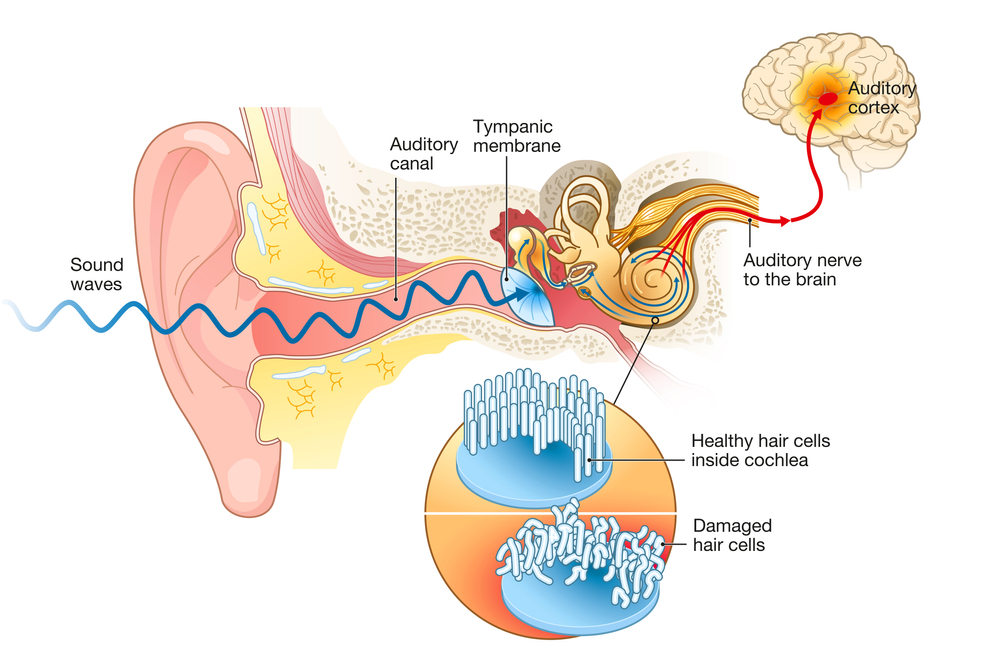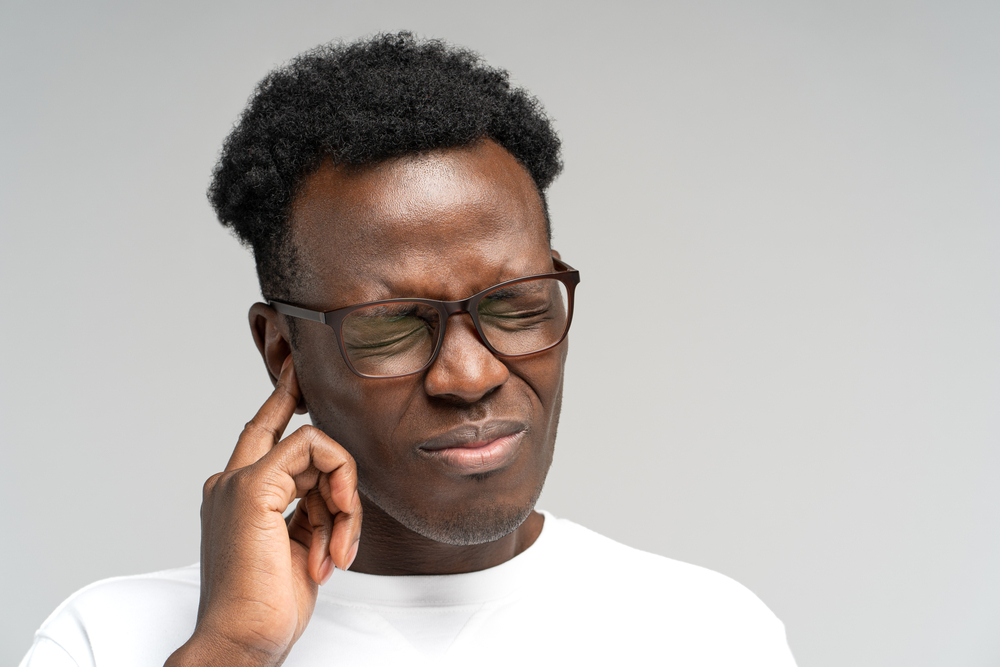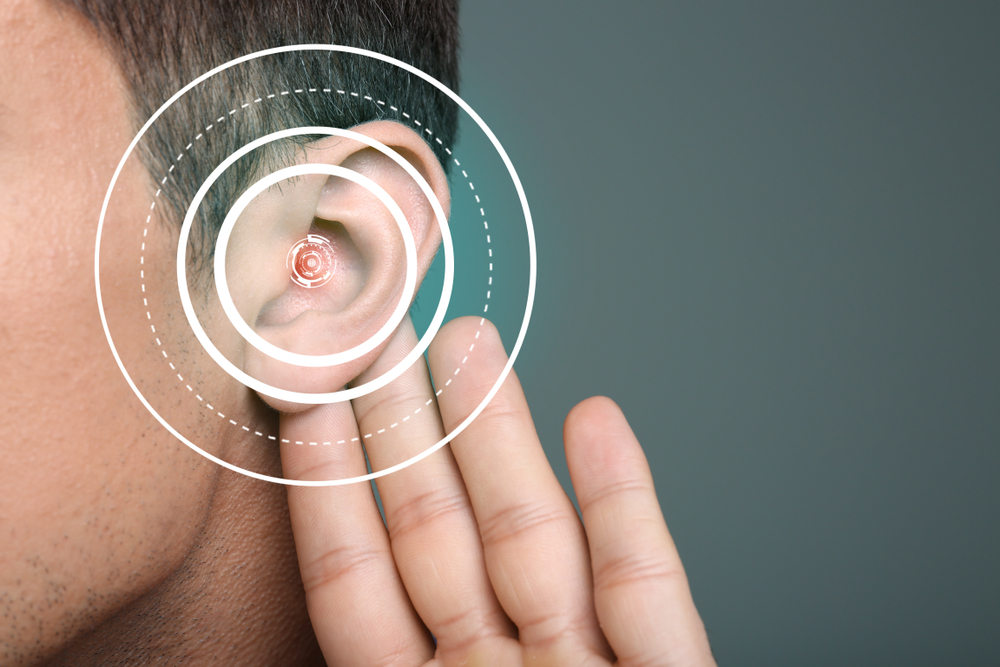What's On This Page?
ToggleTinnitus can be maddening for some people and it’s so sad that we don’t have a complete cure for it. It is a condition characterized by hearing some kind of noise or ringing in the ears, often described as buzzing, roaring, clicking, hissing, or humming, when no external sound is present.
It’s a common symptom associated with many forms of hearing loss, or it can result from an array of health conditions. Tinnitus is not really considered a disease itself (perhaps by some doctors) but it’s probably more of a symptom of an underlying health issue, which could involve the ear, the auditory nerve, or other areas of the brain.
According to the American Tinnitus Association, the condition affects approximately 15-20% of the population in the United States, which equates to around 50 million people! Among these, about 20 million people struggle with burdensome chronic ear noise, while 2 million have extreme and debilitating cases!
Before I delve into the common causes for tinnitus, let’s discuss risk factors. There are many, however these 5 are the most important:
Your Age.
The risk of tinnitus increases with age, primarily due to the cumulative effects of noise exposure and other damage to your auditory system over time. However, it can occur in people of all ages.
How Much Noise Exposure Do You Have?
Chronic exposure to loud noise, such as from heavy machinery, music, firearms, or loud music, can damage the hair cells in the ear and lead to tinnitus. Short-term exposure to extremely loud noise, such as from a concert or explosion, can also cause temporary or permanent tinnitus.
Medical History and Current Conditions.
Tinnitus can be a symptom of various underlying health conditions, including Meniere’s disease, acoustic neuroma, multiple sclerosis (MS), hypertension, anemia, and diabetes (it’s partially due to the nerve damage). Since I am a thyroid expert, and wrote the book on it, I want you to know something:
People with hypothyroidism have a higher risk of getting tinnitus. Treating the low thyroid hormone levels with medication or supplements may help reduce the severity of the tinnitus. You can learn more about this condition in my best-selling book Thyroid Healthy. 
There are other conditions, so just be aware of this if you have an idiopathic case of tinnitus – maybe it’s not idiopathic!
Medications.
Some medications, including certain antibiotics, diuretics, nonsteroidal anti-inflammatory drugs (NSAIDs), cancer medications, and aspirin are associated. I will elaborate more on this soon – hang on! I’m only listing it now because it’s a well-documented risk factor.
Ear and Sinus Infections.
Infections of the ear or sinuses can cause temporary tinnitus. Once the infection is treated, the tinnitus usually subsides. But if left untreated, tinnitus may become severe, and irreversible, it depends on the pathogen.
I don’t want to worry you unnecessarily so let me just say that having one or more of these risk factors does not necessarily mean a person will develop tinnitus, but
The 12 most common reasons for tinnitus
1. Pulsatile Tinnitus: This type of ear ‘hallucination’ matches the heartbeat! That can be very nerve-racking. It can be due to various causes including high blood pressure, changes in the blood vessels near the ear, or increased blood flow near the ears.
2. Meniere’s Disease: An inner ear disorder characterized by ringing in the ear, spinning sensation, and hearing loss. The hallmark feature of this condition is vertigo.
3. Eustachian Tube Dysfunction: This occurs when the eustachian tubes, which connect the middle ear to the back of the nose, don’t open or close properly. This can cause a variety of symptoms including noises in the ear.
4. Medications: Certain medications, especially in high doses, can cause tinnitus as a side effect. See below for a list.

5. Earwax Buildup: Sometimes, a simple buildup of earwax can cause phantom sounds.
6. Blood Vessel Disorders: Conditions such as atherosclerosis or an arteriovenous malformation can sometimes cause tinnitus.
7. Middle Ear Conditions: Problems with the bones in the middle ear can cause hissing or humming sounds.
8. High Blood Pressure: Hypertension can, in some cases, cause pulsatile tinnitus.
9, Anemia: A low red blood cell count can sometimes cause a person to hear the blood flowing through their ears.
10. Acoustic Neuroma: This is a benign tumor on the cranial nerve that connects the inner ear to the brain.
11. Temporal Mandibular Joint Disorder: Disorders of the jaw can sometimes cause tinnitus.
12. Anxiety and Stress: Sometimes, ringing in the ears can be caused or worsened by anxiety or stress.
That is not an exhaustive list and various factors can contribute to tinnitus.
There is some evidence to suggest that changes in blood viscosity and circulation can influence phantom ear sounds. This is particularly true for pulsatile tinnitus, where a person hears a sound that syncs with their heartbeat. Over-thinning the blood, usually through the use of anticoagulants or antiplatelet medications, can alter the flow of blood through the vessels, which in some cases could potentially contribute to or exacerbate tinnitus.
The mechanism is not entirely understood, but it’s believed that changes in blood flow might make the sound of blood moving through the blood vessels near the ear more noticeable.
Additionally, high doses of salicylates (such as aspirin), which have blood-thinning properties, are well known to cause tinnitus in some individuals.
However, it’s important to consider that anticoagulants and antiplatelet medications are often prescribed for very important reasons, such as preventing blood clots and reducing the risk of stroke and heart attack. It is essential not to make any changes to such medications without consulting a healthcare provider.
Several conditions and factors can cause pulsatile tinnitus:
High Blood Pressure: Including hypertension and factors that increase blood pressure such as stress, alcohol, and caffeine. If this topic interests you, read my other article: 5 Natural Remedies for High Blood Pressure that Really (Really!) Work.
Turbulent Blood Flow: Sometimes, the inside of a blood vessel may become irregular causing blood flow to become turbulent and easier to hear.
Vascular Tumor: A tumor with lots of blood vessels, like a paraganglioma or glomus tumor, may produce a sound.
Atherosclerosis: Hardening or narrowing of the arteries can cause turbulent blood flow.
Abnormal Capillaries: Conditions such as arteriovenous malformation (AVM), a tangle of arteries and veins, can result in turbulent blood flow.
Ear Muscle Disorders: Conditions affecting the muscles in the middle ear can cause tinnitus.
Venous Hum: Sometimes, a vein close to the ear can cause this condition.
Increased Intracranial Pressure: Increased pressure inside the skull can be due to idiopathic intracranial hypertension (an increase in pressure around the brain without a clear cause), a brain tumor, or due to the buildup of cerebrospinal fluid (hydrocephalus). Here’s my other article on this topic, Painful Intracranial Hypertension Headaches are Sometimes Misdiagnosed.
Pulsatile tinnitus is often caused by changes or abnormalities in blood flow near the ears. Given this, it’s theoretically possible that anything affecting blood flow, including substances with blood-thinning or antiplatelet effects, could potentially influence pulsatile tinnitus. This could potentially include fish oil and other supplements that have antiplatelet effects.

Pulsatile tinnitus is Dangerous
When the swooshing noise coincides with your heartbeat, you shouldn’t “wait and see” but rather have it checked out. Sometimes a CT scan is needed, and lab tests to determine if there are vascular changes near the vessels surrounding the ear.
It is typically a symptom of an underlying health condition. Therefore, treatment must be focused on treating the root cause. Here are a few potential treatments, both natural and medical:
Managing Underlying Conditions: If the ear sounds are caused by a specific health problem, treating that problem can help. For example, managing blood pressure or atherosclerosis, treating an ear infection, or addressing high levels of anxiety or stress can reduce symptoms.
Sound Therapy: This can involve using external noise to alter the perception of, or reaction to, tinnitus. For example, wearing a device that produces low-level noise or white noise can help suppress the symptoms.
Cognitive Behavioral Therapy (CBT): This form of psychological therapy can help you learn how to cope with tinnitus. CBT can change the way you think about your condition so it doesn’t dominate your life.
Tinnitus Retraining Therapy (TRT): This is a specific type of therapy that aims to retrain the neural system to accept the abnormal sounds as natural rather than disruptive. TRT essentially pushes the noise into the background. A skilled audiologist can do this with you.
Meditation, Yoga, and Mindfulness Practices: Maybe it’s a walk on the trail, journaling, or yoga… these can reduce stress and anxiety, which may help alleviate tinnitus.
Some medications Can Trigger it:
- Aspirin: Especially in high doses.
2. NSAIDs: Such as ibuprofen or naproxen.
3. Antibiotics: Certain antibiotics have been linked to ringing in the ears
4. Antimalarials: Such as chloroquine or hydroxychloroquine.
5. Antidepressants: It’s a side effect of certain antidepressants – usually reversible.
6. Diuretics: Like furosemide (Lasix).
7. Chemotherapy drugs: Including cisplatin.
8. Quinine medications: Used for malaria or sometimes for leg cramps.
If you suspect that a medication is causing tinnitus or if you have concerns about the side effects of medications, it’s important to discuss this with a healthcare professional. They can provide information on potential side effects, alternative medications, and strategies to manage symptoms.
Above, I have listed the medication offenders, but what about the drugs that are useful in terms of treatment? I’ll delve into that now.
Pharmaceutical Management
In terms of medication, there are no FDA-approved drugs specifically for the treatment of tinnitus, but some medications are prescribed for it, and some are used off-label to help:
Tricyclic antidepressants: Such as amitriptyline and nortriptyline, have been used with some success. These take about 6 – 10 weeks to take full effect, they don’t work right away.
Alprazolam (Xanax®): This may help reduce tinnitus symptoms, but the side effects can be debilitating. This will work within a few doses. Be careful though, benzodiazepines cause dependence.
Steroids: In certain cases of inflammation or immune system irregularities. You know these medications as prednisone, hydrocortisone, dexamethasone, and others. Staying on them long-term can reduce the integrity of your bones so always take them properly, and with physician supervision.
Certain Antiviral or Antibiotic Medications: If an infection is the cause, and it can be, then a medication from one of these categories is helpful. For example, if you have an ear infection, it can cause ringing/swooshing/hissing etc…and taking cephalexin or amoxicillin might clear it up! But it’s not a guarantee either.
Diuretics: If fluid buildup is the cause, diuretics can help. For example, think of allergies, a cold or flu, or an ear infection. The middle ear is an air-filled space located behind your eardrum and it can sometimes fill with fluid if you have one of these conditions. Then it muffles the sounds you hear and causes a sensation of pain and fullness or pressure on the side of the head. It can also lead to tinnitus. Another example is with increased intracranial pressure, a diuretic can be used to help solve the problem.
Natural Remedies that Could Help You Navigate the Noise
Ginkgo Biloba: This herb is often marketed for tinnitus relief, as it’s thought to increase blood flow to the head and neck. However, scientific studies have yielded mixed results, and it’s not universally recommended.
Zinc: Some studies suggest that zinc supplements might help with ear noise, especially in people who are zinc deficient. However, other studies show no benefit.
B Vitamins: B vitamins, particularly B12, have been explored for relief. Deficiency in B12 has been associated with phantom ear sounds in some studies, and supplementation might help in these cases.*
Melatonin: This hormone produced by your pineal gland, but also sold as a dietary supplement has been used for the associated insomnia that occurs.
Magnesium: Some studies have suggested that magnesium supplementation might provide some relief too. It’s not a cure, it may help with blood pressure and vascular health.*
It’s important to reiterate that while the remedies and supplements I’ve listed here could potentially help with tinnitus symptoms, they are not a cure for the underlying cause, and you should speak to your practitioner(s) about their use.
Infections
Lyme Disease: This bacterial infection, transmitted through tick bites, can cause a number of neurological symptoms, including tinnitus. Whether it’s the spirochete itself, or a co-infection of Lyme (ie Bartonella aka “cat scratch fever” or Babesia, or others) having a tick bite may explain what would otherwise be called idiopathic tinnitus.

Meniere’s Disease: While the exact cause of this inner ear disorder is unknown, some researchers suspect that it might be linked to viral infections. Symptoms include tinnitus, vertigo, Possible suspects include the herpes simplex virus, varicella-zoster virus, and other viruses in the herpes family.
Certain Viral Infections: Viruses such as measles, mumps, and mononucleosis can potentially lead to hearing damage and ear noise.
Herpes Zoster Oticus (Ramsay Hunt syndrome): This is a complication of shingles, caused by the varicella-zoster virus, that affects the ear.
Human Immunodeficiency Virus (HIV) and Acquired Immunodeficiency Syndrome (AIDS): Ringing (hissing/swooshing etc) in the ears is a farily common symptom in people with HIV/AIDS, possibly due to the virus, or maybe even the antiretroviral medications used to treat it.
COVID-19: Emerging evidence suggests people who’ve had this have also reported tinnitus, either as a direct effect of the virus, an indirect effect due to stress, or a side effect of certain medications used in the treatment of the disease.
Summary
Lifestyle changes are recommended if you have any kind of tinnitus. For example, reducing caffeine and alcohol intake is a good idea. If you smoke, consider quitting. Fitness is important, as is good sleep hygiene. Relaxing more and reducing stress won’t make it go away, however, it can’t hurt and is better for your blood pressure.

You may be wondering what kind of physician to see if you have this problem. It’s a good question since the noise can be overwhelming, and not a lot is known about the condition.
I’d suggest seeing an ENT (Ear, Nose and Throat) doctor for a comprehensive evaluation. They can check your sinuses, and ears and do some basic audiology tests. You may be referred to a special audiologist for more testing and treatment.
If it is very severe and impacts your emotions and psychological health due to it being unrelenting and loud, then a therapist or mental health provider could be potentially useful. But most of all, I think finding the underlying cause of tinnitus is critical to solving the problem and feeling well again.
Resources
American Tinnitus Association (ATA): The ATA provides a wealth of information including detailed explanations of the condition, treatment options, current research, and resources for support. Their website is www.ata.org
British Tinnitus Association (BTA): Although it’s based in the UK not here in America, the BTA provides helpful resources for people all over the world and you can access them via their website: www.tinnitus.org.uk. Just like the ATA, this website offers comprehensive information including causes, treatments, and practical strategies for managing the condition.

Suzy Cohen, has been a licensed pharmacist for over 30 years and believes the best approach to chronic illness is a combination of natural medicine and conventional. She founded her own dietary supplement company specializing in custom-formulas, some of which have patents. With a special focus on functional medicine, thyroid health and drug nutrient depletion, Suzy is the author of several related books including Thyroid Healthy, Drug Muggers, Diabetes Without Drugs, and a nationally syndicated column.


